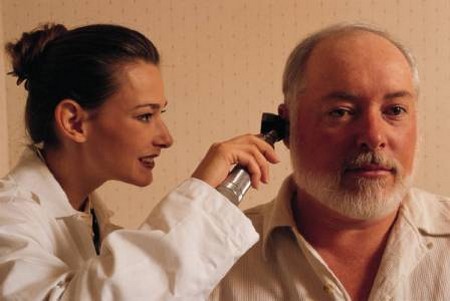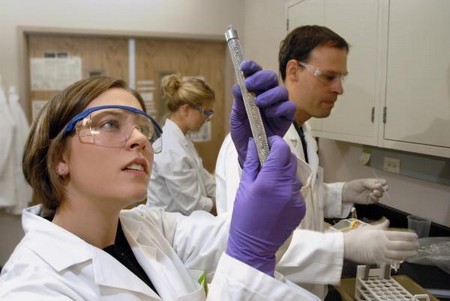Today, the field of medical science has expanded so that several different specializations fields have evolved depending on many diverse diseases and disorders. Doctors usually choose any one area or field to specialize in and carry on their services in that relevant field. These are considered as professionals and experts in their specialized field.
Doctor or physician is a person who has trained in medical science, whose job is to cure or treat the people suffering from certain diseases or disorders. Becoming a doctor is a noble profession and is thought next to the godliness as it involves the treatment of severe disease, saving lives, new births, and giving hope to the sick and ailing people. Whenever one get sick or ill, he consults the doctor. Depending on the type of illness, we choose to consult the doctor who is specialized in that field of medicine. So, different diseases and disorders have different doctors and physicians who have trained and specialized in that particular field and can treat it better than other doctors. This is how we distinguish between different types of doctors. There field of specialization, their areas of expertise and their experience all make them competent doctors. It is possible that a single doctor has specialized into more than one field. It is often happened that the doctors specialize into more than one field but they are all somehow linked together.

Although, everyone has a good defensive system against several diseases and illnesses, at times over immune system fell weak for some reasons and our body fell victim of infections and diseases. Sometimes these diseases are minor and sometimes they get severe as well as life threatening if not treated or diagnosed at time. There are several types of diseases and disorders which are caused by microorganisms or parasites, imbalances of the chemicals, genetic or hereditary problems and non-functioning of body organs. Even sometimes people may have accidents natural or man made they may be such as gunshots, burns, stabbing, or grievous injuries. All these medical problems are taken care and treated by the doctors. Here the medical expertise of doctors pulled the people out of the death jaws. We have so many such instances in our lives where doctors have saved the lives of so many people injured or medically ill. So, we can say that the profession of doctors’ demands respect and high esteem from people of all classes as services of doctors are equal for every person.
For those who want to take this challenging medical career, below is given the list of some of the types of doctors which will help them to choose a right medical field for their future profession.
Audiologists: It is a branch of medical science which deals with the hearing, balance and other ear related problems and those who specialize in this branch are known as audiologists. Audiologists treat the people of all ages from children to old people. Their job is to diagnose symptoms of hearing loss, auditory, balance, sensory and neural problems and treat them according to the nature and extent of the problem. Audiologists make use of different equipment such as computers, audiometers and other devices to examine and diagnose the impact of hearing loss and balance disorders. On the basis of these results and other available information, audiologists determine a proper and suitable course of treatment.
Allergist: The hypersensitive disorder of the immune system is termed as allergy. Allergist or immunologists specializes in the field to treat various allergic and immunologic diseases. Allergists’ job is to diagnose and treat the allergic rhinitis, asthma, allergic eye diseases, urticaria (hives), atopic dermatitis (eczema), chronic sinus infection, chronic cough, and common colds/bronchitis and immune problems. Other areas of focus include food allergy, latex allergy, bee sting allergy and medication allergy. An allergist may recommend their patients to try using allergy drops. You may read online articles to get the facts on allergy drops.
Andrologists: Andrologists deal with the problems of men related to reproductive health. Andrologists’ job is to diagnose and treat the male patients with hormonal disorders, erectile dysfunction, fertility issues and other problems related to reproductive health through conducting physical examinations and prescribing appropriate medications. Andrologists also perform routine surgical procedures like vasectomies and provide treatments like erectile dysfunction treatment. If you want to know the differences between TRT and steroids, check it out here.
Anesthesiologists: Anesthesiologists are the doctors who specialized in the use of anesthesia and related issues. Their major duty is to assist the surgeons during the surgery by giving a suitable amount of anesthesia to the patient. Other duties involve helping in the treatment and diagnosis of disorders.
Cardiologists: A cardiologist is a doctor who deals with the problem related to the cardiovascular system (the heart, veins, and arteries). To qualify as a cardiologist (to obtain certification), one has to obtain knowledge about internal medicine and other specialties as cardiology is classified as an internal medicine subspecialty.
Dentists: Dentists like Dentist Cardiff deal with the tooth extraction. Their area of specialization includes dental health, problems related to the cavities and bleeding gums. Their job is to diagnose and treat various conditions like gum disease, TMJ and TMD treatment, teeth whitening such as teeth whitening in Destin, FL, straightening of teeth such as those at services like Brodie Bowman Orthodontics – types of braces, and root canal treatment.
Dermatologists: The doctors who deal with the diagnosis and treatment of problems of skin are known as dermatologists. Their area of specialization includes structure, function, and skin diseases and other related parts such as nails, hairs and sweat glands. There are also dermatologists that specialize in treating children’s skin such as pediatric dermatology in Charlotte, NC.
Endocrinologists: The main area of specialization of endocrinologists is the diseases and treatment of glands. They are trained to treat conditions often complex and have many systems within your body. If you are having a problem in your endocrine system, you will be referred to endocrinologists.
Epidemiologists: He who studies the patterns of diseases or health risks within a population groups, societies and cultures is known as epidemiologists. The job of the epidemiologist is to examine how diseases affect certain populations and the emergence of viruses in any particular geographical location and how to minimize them by tracing the root cause of such diseases. Epidemiologists also make predictions about possibility of disease occurrence.
Family Practicians: These are known as friendly neighborhood doctors who treat people of all ages in medical or non-emergency conditions in their private clinics.
Gastroenterologists: The doctors who specialize in the diagnosis and treatment of the diseases of the digestive system (gastrointestinal tract) are known as gastroenterologists. The job of these doctors is to diagnose and treat the diseases that affect the stomach, esophagus, small and large intestine and biliary system which include liver, pancreas, bile ducts and gallbladder. Gastroenterology is another subspecialty of internal medicine.
Gynecologists: A doctor who specializes in the women’s reproductive system, i.e. ovaries, uterus, vagina or conditions related to urinary tract such as stress incontinence is known as gynecologist. Gynecologists are not only trained to analyze, recognize and treat possible reproductive system’s disease but also got some surgical training to perform surgeries such as hysterectomies (removal of the uterus). Sexually active women who are eighteen or younger should see a gynecologist once in a year to get examined for issues like cervical cancer.
Hematologists: Hematologists deals with the conditions related to the blood. They thoroughly study the different organs that are involved in forming a blood such as spleen and bone marrow. Hematologists work under variety of medical environments such as they work in blood banks, private clinics or in pathology laboratories. In order to serve their patients better, they can also choose a specific area within the field of hematology to focus on.
Hepatologists: Hepatology is a branch of medicine that deals with the liver, gallbladder, biliary tree and pancreas and the one who specializes in this branch is known as hepatologist. Becoming a hepatologists involve many different phases such as first you need to graduate from medical school and complete a residency in internal medicine. Then you need to get training in the form of a fellowship in gastroenterology and lastly, you need to get fellowship training focusing on the liver. Hepatologists deal with the problems regarding the liver such as hepatitis and also dealing with the patients of liver transplant.
Immunologists: Immunity is a branch of medical science which deals with the immunity (resistant to disease) and he who practice immunology in detail is known as immunologists. Immunologists are considered as research scientists or practicing specialists, who thoroughly study, examine and treat diseases of the immune system. Immune system of the body is accountable for protecting the organism system present within the immune system from infection or diseases by foreign matters. The major area of focus of the immunologists is to find out the diseases that influence the natural immunity. Some of the common diseases are allergies, pneumonia, abscesses and sinus inflations.
Infectious Disease Specialists: As the name suggests, infectious disease specialists deal with the diagnosis and treatment of all sorts of infections, including those caused by parasites, viruses and bacteria. Being an expert in this specialty, they diagnose and treat the infectious diseases in any organ or area of the body. Infectious disease specialists perform their duties in clinics, research facilities and medical centers. They are partially physician and partially investigator.
Internal Medicine Specialists: These are trained and expert in diagnosing, examining and treating non-surgical diseases which are severe and unusual. They normally work as intensivists in the medical centers or hospitals.
Internists: They are doctors having a lot in common with general practitioners (GPs). Most of the internists offer their services as primary care physicians as that of GPs.
Unlike GPs, internists spend more time in training to specialize in a particular internal organ or system. For instance, an internist who wants to specialize in the digestive system, he has to see a lot of patients with problems regarding digestive system such as liver, intestine, stomach. Apart from this they have to see the patients with other medical conditions such as flue, cold.
Medical Geneticists: A doctor who deals with the genetically-linked diseases is called as geneticist. A geneticist is an expert in diagnostic and therapeutic procedures for patients with genetically-linked diseases. Geneticists use a modern ways like cytogenetic, radiologic and biochemical testing that assist them in specialized genetic counseling, apply the required therapeutic interventions and provide prevention through prenatal diagnosis. Also, they plan and coordinate large-scale screening programs for inborn errors of metabolism, chromosome abnormalities, neural tube defects and hemoglobinopathies.
Microbiologists: They are trained in such a way that they can have a thorough knowledge about the microbes that is, how they live and how they affect the world around them. Microbes are capable of taking the form of bacteria, virus and fungi.
Microbiologists because of the diverse nature of microbes often focus on any specific type of microbe. For instance, those who focus their study on the bacteria are called bacteriologists and those who focus on viruses are called virologists.
Neonatologists: Neonatologists deal with the premature and ill newborns. These doctors after completing their graduate studies in medical sciences then do a residency in pediatrics and finally complete fellowship training in neonatology. Neonatologists work in hospitals and found in the neonatal intensive care unit (NICU) or in special care baby unit (SCBU).
Nephrologists: A nephrology is a branch of medicine that deals with the treatment and diseases of kidneys. The doctor who specializes in this branch is called nephrologist. The term ‘nephrologist’ is a combination of two Greek words, ‘nephro’ means kidney and ‘ologist’ means someone who studies. Nephrologists who are also called kidney doctors focus on the treatment of chronic kidney disease (CKD), acute renal failure, polycystic kidney disease (PKD), high blood pressure, and kidney stones. They are also expert in the matters of kidney transplantation and dialysis.
Neurologists: Brain is a delicate and an important organ of human body. The doctors who specialize in the treatment of diseases and disorders of the human brain are called neurologists. The common diseases of brain that are treated by neurologists are seizures, stroke, Parkinson’s or Alzheimer’s.
Neurosurgeons: Neurosurgery is a branch of science that deals with brain and spinal cord. Becoming a neurosurgeon requires years of hard work, precision and experience because it is a complex and extremely advanced form of surgery. There are a limited number of qualified, experienced and professional neurosurgeons across the world and usually have high consultancy fees. The facilities of neurosurgery are limited to major hospitals and people need to travel to urban areas in order have their neurosurgery.
Obstetricians: These doctors have their focus on the childbirth and C-section. They are in close proximity to gynecology and are therefore well trained in gynecological surgeries such as hysterectomy and ovarian tumor removal, PAP Smears along with prenatal care, and pelvic region examination.
Oncologists: These doctors are trained and qualified in the treatment of cancer. An oncologist has a thorough knowledge about different types of cancer and their appropriate treatment. However, an oncologist can specialize in any one type of cancer treatment.
Oncologists should have a wide knowledge about the procedures and treatment involve in dealing with different types of cancers. The doctor should be well aware of the fact that when to conduct which test for an accurate diagnosis so that he/she can implement the treatment accordingly.
Ophthalmologists: An ophthalmologist is known by different names such as an Eye M.D. (medical doctor) or doctor of osteopathy (D.O.). Ophthalmologists specialize in the medical and surgical treatment of an eye disease or other eye related conditions. However, they also provide routine vision care services to their patients by prescribing eyeglasses and/or contact lenses. Becoming an ophthalmologist requires you to have a four years of medical schooling, one year of internship in a hospital and a three year residency in any other the approved ophthalmology teaching program. An ophthalmologist can also opt for two additional years of fellowship training that focuses on any particular area of medical or surgical eye care.
Orthopedic Surgeons: The doctors who specialize in the field of study of skeletal system and bones are called orthopedic surgeons. Their jobs include the treatment of broken and fractured bones and also the bones which are affected by arthritis.
ENT Specialists: ENT stands for Ear, Nose and Throat and ENT specialists are the one who specialize in the field of otolaryngology. ENT specialists also involve in the treatment of diseases of the head along with neck.
Perinatologists: They are also known as maternal-fetal medicine specialists. They usually deal with care of high risk pregnancies. Those women who have a history of complications during pregnancy are often referred to perinatologists for proper treatment. The job of a perinatologist is to assist women to have pregnancies as healthy as possible and to cure or treat any problem that arises during the pregnancy. If you want to become a perinatologist, you have to finish a residency in obstetrics and fellowship training in maternal-feta medicine.
Paleopathologists: The doctors who study the ancient diseases and other illnesses found in human remains or in the remains of other organisms are called paleopathologists. In order to learn about ancient diseases and birth defects, paleopathologist, anthropologists, archeologists, and geneticists study the diseases mummy and fossil remains and other biological material like human waste. The study of ancient ailments and diseases help the paleopathologists to understand the current diseases and ailments in a better way.
Parasitologists: The doctors who study the parasites and the relationship of parasites with their hosts are called parasitologists. Parasitology is a branch of science that deals with the study of protozoan and metazoan parasites. Parasites are found in plant life and in animals. The parasitologists examine different aspects regarding parasites such as how parasites move from one host to another and how they affect the host. The job of parasitologists is to devise ways to fight against these parasites and avoid them from spreading. Parasitology is a branch of science that shares some characteristics with other disciplines such as molecular biology, immunology, microbiology, and cell biology.
Pathologists: Pathology is a branch of medical science that deals with the study of diseases and the abnormalities present in the living organisms. Pathologists are the doctors who specialize in pathology. Pathologists examine the blood or biopsy to diagnose the nature of the disease. Pathologists are normally found in laboratories where they carry out autopsies to inspect the cause of death. An important area of specialization in pathology is forensic pathology.
Pediatricians: According to the American Academy of Pediatrics (AAP), pediatrics is a highly flexible specialty that offers n astonishing number of career options. They have a lot to choose from.
The job of the pediatricians include the study of physical, emotional, and social health of the infants, children, adolescents and young adults from birth to 21 years of age. Pediatricians are highly qualified, skilled and trained doctors whose focus is on the detection, prevention and management of physical, behavioral, social and developmental problems that can have a severe affect on the children.
Physiologists: Physiology is a branch of medical science that deals with the functions of living things. The doctors who specialize in physiology are called physiologist. Physiologists are of different types such as cardiac physiologists, neurophysiologists, and exercise physiologists. Each of them has specific training in their area. For instance, exercise physiologists specialize in the physiology of exercise. They focus on the implementation of exercises and monitor the cardiovascular and metabolic effects. They have a close look on the physical abilities and use exercises that enhance and maintain the overall health and conditioning. Physiologists often work with other healthcare professionals to evaluate the risk and suggest a comprehensive rehabilitation program.
Physiatrist: They are also called rehabilitation doctors. The focus of physiatrists is on the treatment of people suffering from both minor and serious physical injuries. Physiatrists completes there four of medical study and complete three of residency. In the end they get a one year internship. During all these years their training focuses solely on nerve, muscle, and bone injuries. They are specially trained to deal with such conditions without resorting to surgical procedures.
Plastic Surgeon: As the name suggests, these professionals like Plastic Surgery Specialists of South Florida – tummy tuck perform cosmetic surgery with a view to repair the structural problems of skin. Cosmetic surgery like liposuction in Boston, MA or SculpSure in El Paso, TX often alters the patient’s personality for good and they may have changed looks which eventually changes patient’s life.
Podiatrists: They are also known as doctor of podiatric medicine (DPM). The main focus of podiatrists is on the treatment of ankle, foot and other related body systems.
Podiatrists receive special training the problems related to the foot care. Their job is to diagnose, treat and prevent the disorders of foot and ankle by both medical and surgical means. After getting a four year undergraduate degree, podiatrists have to spend four years in the medical college studying podiatric medicine.
Psychiatrists: Psychiatry is an important branch of medical science that deals with the study of diagnosis and treatment of people with mental illness. Psychiatrists specialize in the field of psychiatry and work under different settings to treat the people with mental illness. In America, he who completes his study in the relevant field has to take the exam set by the American board of Psychiatry and Neurology to get board certification. The board certification is an additional qualification that makes this thing certain that the concerned doctor is highly qualified and knowledgeable in the respected field. This helps patient to evaluate things easily by selecting a qualified psychiatrist.
Pulmonologist: Pulmonology is a specialty that deals with the diseases of respiratory tract and respiratory system. Pulmonologists specialize in pulmonology and their primary job is to conduct analyzing tests, research symptoms, and to work with other healthcare professionals to administer proper treatment. Pulmonologists also treat the patients with chronic conditions like asthma or any other acute complications of respiratory failure. Pulmonologists work in hospitals, clinics, and emergency care centers.
Radiologists: They are expert on radiology where they make use of radiant energy in medical diagnosis and therapy. Radiologists study X-rays and many other imaging technologies which are helpful in diagnosis and treatment of different diseases.
Surgeons: Surgeons are qualified doctors who has license to perform operations and surgeries. Surgeons are of different types which can perform operations in various specialties of medicine like cardiothoracic surgery, general surgery, ENT, neurosurgery, cardiovascular surgery, oral surgery, plastic surgery, maxilla-facial surgery and transplant surgery.
Urologists: Urology is a subspecialty of surgery that comes from the Greek word that means the ‘study of urine’. Urologists are doctors who study the diagnosis and treatment of the diseases and injuries to the urinary tract of women and the urogenital system in men.
Emergency Doctors: Emergency doctors are the doctors who work in the emergency rooms and are available for services 24/7. They are trained to handle the cases of emergency such as poisoning, heart attack, burns, accidents, broken bones and so on.
Veterinarian: These doctors specialize in the animals and their diseases. Veterinarian doctors have different types depending on the areas of expertise they have in animal problems.
These are some of the important types of doctors and the details of their job and work. There are about 50-60 areas of specialization in the field of medical science. You can find several different types of doctors working under a same specialty. You need to have a thorough knowledge about different fields so that you can choose a right field of study for yourself.



